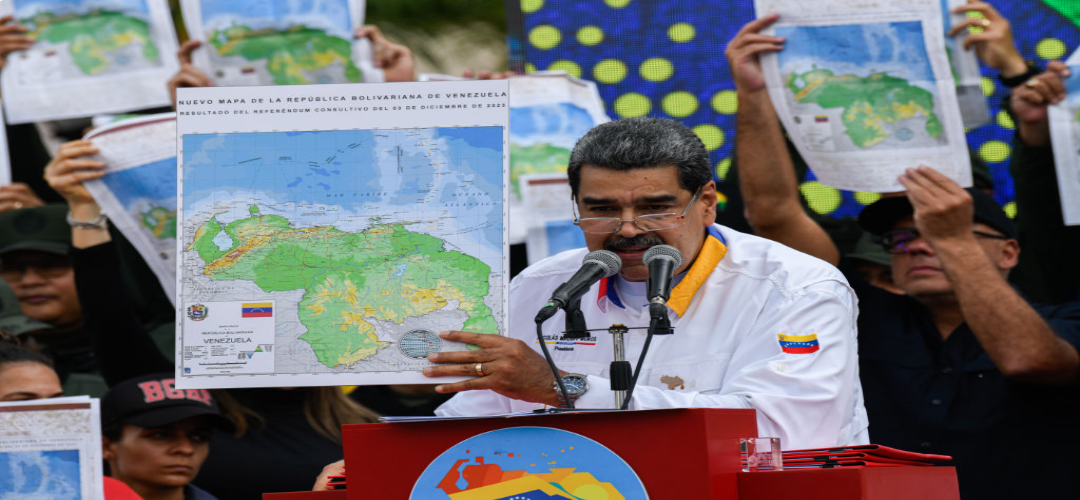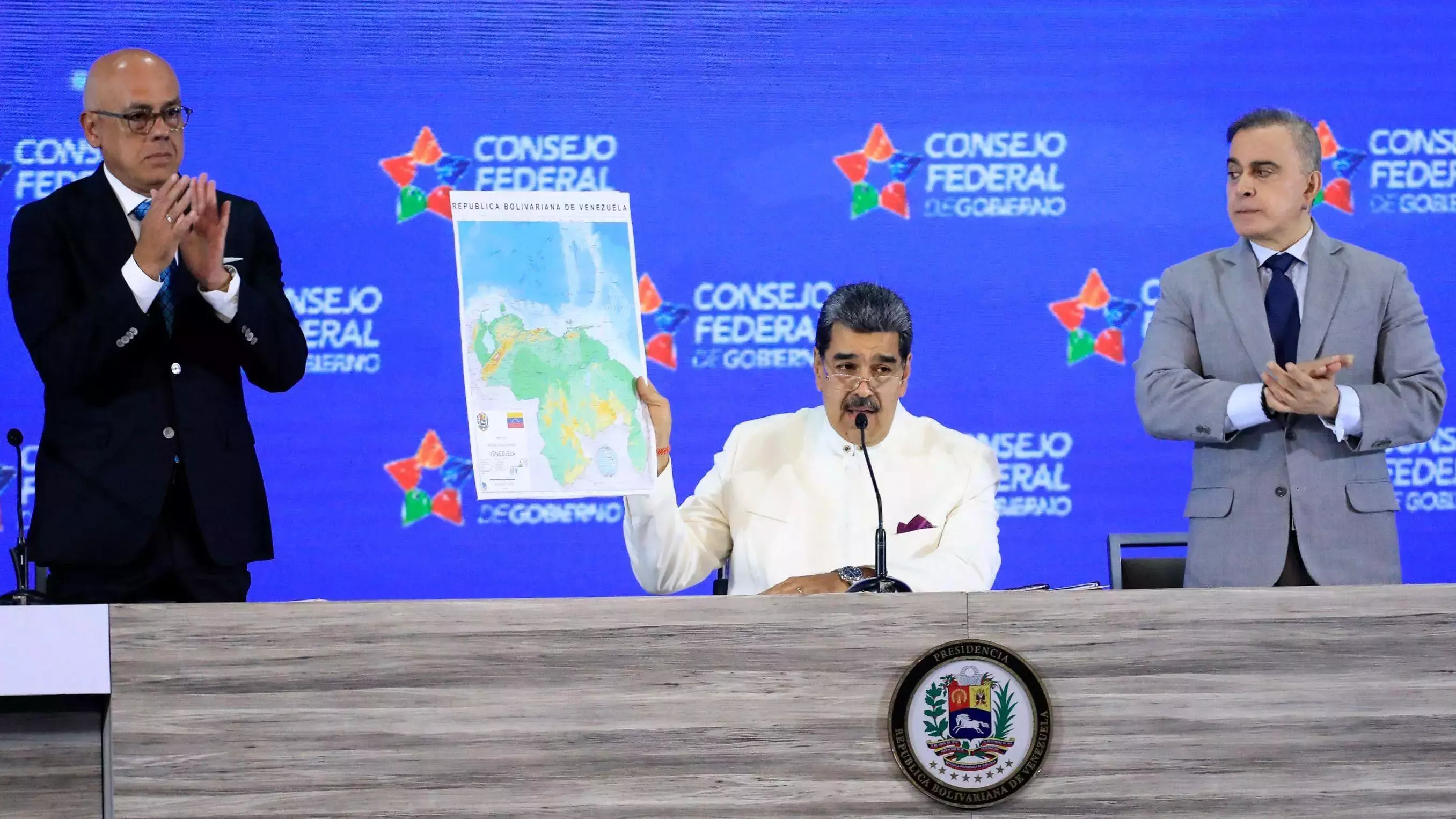Hints of a War
December 23, 2023 | Expert Insights

Earlier this month, Venezuelan President Maduro publicly called for a bill to create a new province called 'Guyana Essequibo’ and even went as far as to ‘order’ Venezuelan companies to get ready to exploit the fossil fuels and minerals in the region. However, he conveniently omitted to mention that neighbouring Guyana has been administrating the Essequibo since the frontiers were fixed by an arbitration panel in 1899. This daring move followed a referendum in which more than 50 per cent of Venezuelan voters supported their government's claim to the oil-rich border region administrated by Guyana.
Not surprisingly, the Guyanese President, Irfaan Ali, called it a 'direct threat' and warned that he would take his case to the UN Security Council. Earlier, the International Court of Justice warned Caracas against attempting to annex Essequibo by force or otherwise.
The recent meeting between Irfaan Ali and Nicolás Maduro marked a fragile detente in a long-standing territorial dispute that threatens to boil over.
The dispute centres on the Essequibo region, a vast territory comprising nearly two-thirds of Guyana's landmass. Venezuela claims the region as its "Guayana Esequiba," a contention fuelled by a potent mix of historical grievances, resource riches, and political agendas. While the agreement not to use force offers a glimmer of hope, the underlying tensions remain deeply entrenched in history, political realities, and resource interests. Understanding the complex tapestry of this conflict is crucial to assessing its implications for regional and international relations.
Background
The seeds of the dispute were sown in the 19th century when Venezuela and British Guiana (later Guyana) engaged in territorial clashes. Venezuela inherited Spanish claims to the region, while Britain's presence stemmed from Dutch settlements. Conflicts over borders and trade culminated in the arbitration of 1899, where a tribunal of five international jurists, with two Americans chosen by Venezuela, awarded the Essequibo territory to British Guiana.
Venezuela vehemently contested the award, alleging procedural irregularities and undue British influence. They pointed to the tribunal's reliance on an inaccurate map submitted by Britain and questioned the neutrality of the American jurists. This historical grievance remains a core argument in Venezuela's claim to the Essequibo.
The Essequibo region boasts vast natural resources, including gold, diamonds, bauxite, and, most importantly, oil. The discovery of offshore oil reserves in the 2010s transformed the dispute, turning the Essequibo into a high-stakes battleground. For Guyana, oil riches offer a potential pathway to economic development and poverty reduction. They have begun oil production and signed lucrative contracts with international companies, promising significant revenue streams. Losing the Essequibo would deprive Guyana of these vast resources and cripple its economic aspirations. The Essequibo's resources represent a tantalising lifeline for Venezuela, already mired in a severe economic crisis. Maduro's government sees control of the oil reserves as a potential solution to its economic woes and a source of political leverage on the international stage.
The turning point came in December 2023 when Venezuela held a controversial referendum, asking its citizens whether they supported incorporating the Essequibo region into Venezuela. The referendum, widely condemned by Guyana and the international community for its lack of transparency and limited scope within Venezuela, nevertheless showed an overwhelming majority in favour of annexation. This move further escalated tensions, with Guyana seeking the International Court of Justice (ICJ) intervention and international condemnation raining down on Venezuela.

Analysis
Understanding the motivations behind both leaders is crucial. President Ali, facing a delicate political situation at home, has taken a firm stance, refusing to compromise on Guyana's territorial integrity. His position resonates with Guyanese nationalism and plays well with a domestic audience wary of Venezuelan encroachment. For Maduro, the Essequibo dispute offers a convenient distraction from Venezuela's internal woes. It allows him to rally nationalistic support and deflect attention from the country's economic and political crisis.
The future of the Essequibo dispute remains uncertain. While the recent agreement to avoid force offers a reprieve, the underlying issues remain unresolved. The ICJ case could drag on for years, with no guarantee of a definitive solution acceptable to both sides. The discovery of further oil reserves could further escalate tensions, making the region a potential flashpoint for conflict.
The Essequibo dispute has already strained relations between Guyana and Venezuela, impacting regional stability and cooperation. It has also drawn the international community's attention, with countries like the United States, Canada, and the European Union urging both sides to find a peaceful resolution. The dispute could further polarize the region, dividing countries along ideological lines and hindering regional integration efforts.
The international community is concerned about the potential for escalation and the negative impact on regional stability. The ICJ case offers a legal framework for resolving the dispute. However, achieving a lasting solution will require not only legal arguments but also political will and a willingness to compromise on both sides. The international community's role will be crucial in facilitating dialogue, promoting peaceful solutions, and upholding the principles of territorial integrity and international law.
The dispute hinders regional cooperation and development in several ways. Tensions between Guyana and Venezuela impede joint ventures in areas like infrastructure, trade, and environmental protection. Uncertainty surrounding the border discourages investment in the region, stalling economic growth and job creation. Furthermore, the dispute casts a shadow over regional organizations like CARICOM, hindering their ability to function effectively and address broader issues affecting the Caribbean. It also complicates relations with other South American nations, forcing them to navigate delicate diplomatic waters.
Assessment
- The international community can play a crucial role in facilitating a peaceful resolution to the dispute. The ICJ offers a legal avenue for binding arbitration, but Venezuela's rejection of its jurisdiction complicates matters.
- Regional bodies like CARICOM and the Organization of American States (OAS) can contribute by encouraging dialogue and offering mediation services. Individual countries with expertise in conflict resolution, like Canada and Norway, could also provide valuable assistance.
- The international community, including the UN Security Council, can exert pressure on both parties to uphold international law and engage in good-faith negotiations. They can also leverage economic incentives and sanctions to promote a peaceful resolution.








Comments